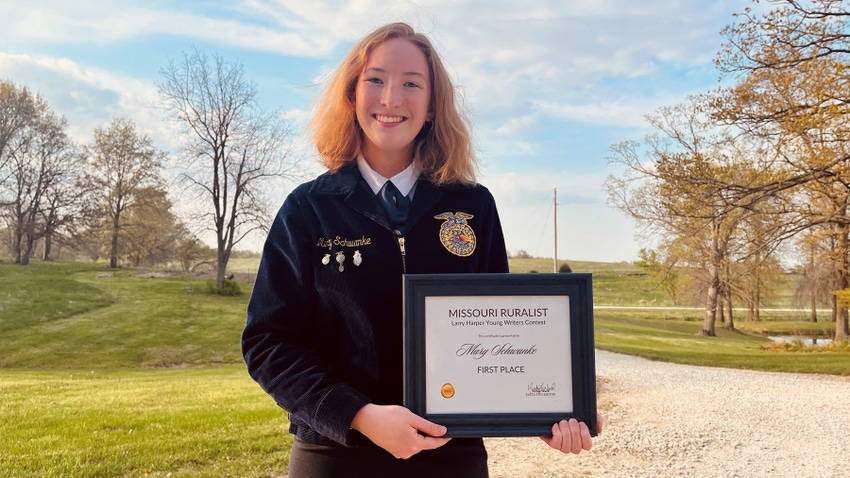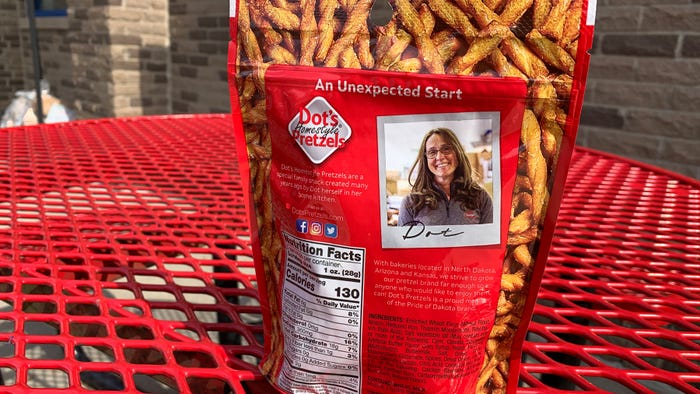April 28, 2023

Editor’s note: Each year, Missouri Ruralist sponsors the Larry Harper Young Writers Contest. This year, we asked FFA members how the agriculture industry could do a better job of sharing its message. Winners were announced at the 95th Missouri State FFA Convention on April 21. Here is the top essay from the contest.
by Mary Schwanke
Several years ago, I fell in love with Dot’s Pretzels. The savory snack was delicious, sure, but that wasn’t what charmed me. What made Dot’s more than a snack was Dot herself.
On the back of every package and front and center on the business’s website is the story of a North Dakota family and a lady named Dot. She perfected the art of seasoning pretzels and wanted to share the treats with her friends and neighbors. The once-small business’s sales grew by approximately 56% in 2022 alone. Customers like the pretzels, but they love Dot.
Personal stories create a social impact. That’s why brands will include their story on their packaging or put a face to their name. It creates a sense of trust that is used to bridge the gap between producer and consumer. We social creatures are more likely to support the people behind the company than the company itself. A disconnect between the people involved in an industry can decrease overall appreciation, as we have observed in agriculture now more than ever.

TELL YOUR STORY: Whether on the back of a big-name snack food package or small farmers market label, sharing your story will help consumers understand the ag industry.
It wasn’t always this way. Seventy-two percent of the American workforce was employed by agriculture in the 1820s. In those days, almost everyone in the United States was directly connected to people in ag. They produced their own food and fiber. Even those who didn’t, had a general idea of who did. The ag industry was connected through relationships.
That same employment number has since dropped to 10.5%. Most people no longer have any idea who produced the food they eat. It’s harder for consumers to trust an industry when they have no relationship with the producers.
According to an Engine Insights CFANS consumer survey, only 24% of adults living in the U.S. have a high degree of trust in the information they receive about where their food is grown and how it’s produced. Only 27% of respondents reported a favorable impression of agriculture and food production. With the increasing distance between farm and fork, consumers are becoming distant themselves.
We can teach the country about the agriculture industry and production methods, but that’s still not as effective as introducing them to the farmer. What if, instead of attempting to bridge the gap between outsiders and the ag industry, we bridge it between the people and the people.
To renew trust, more farmers must share their unique stories, like Dot. We must encourage and aid agriculturalists from all walks of life to share their place in ag, as well as the struggles that come from a lack of appreciation for it.
FFA members are in an excellent position to step up in this aspect by using social media to share with their generation the impact agriculture has had on their childhoods. Agribusinesses have platforms that can be used to reveal the individuals behind the services they provide. Regardless of the form of "agvocacy" utilized, we must always strive to put names and faces to agriculture and make it personal.
America will start to love using ethanol at the gas pump because it makes them think of my neighbor, Joshlin Yoder, who is a corn grower and father. They won’t be afraid of nonorganic lettuce because they’ll understand Aunt Susan’s pesticides serve to protect her crop and do not make the greens dangerous. They will realize that my father, Jesse Schwanke, cares about the health of his soil and water because his land is a precious family heirloom.
If we bridge the disconnect between the people, we will harvest more appreciation. People will like ag, but they’ll love agriculturalists.
Read more about:
FFAYou May Also Like




